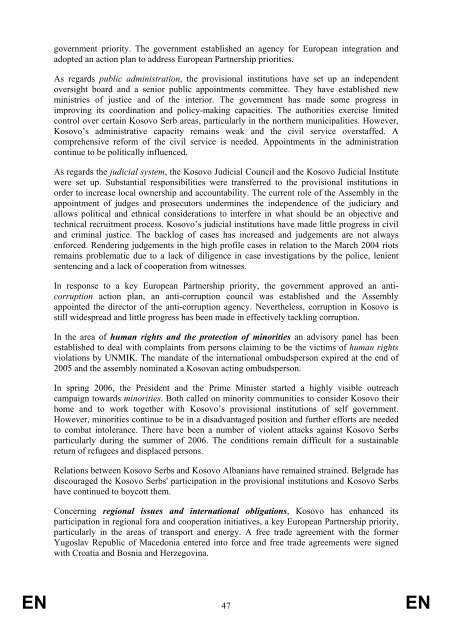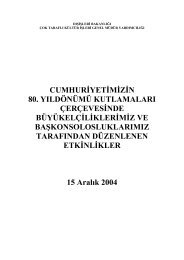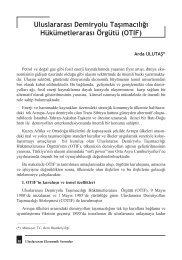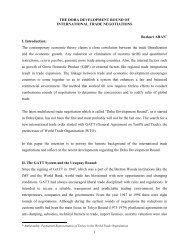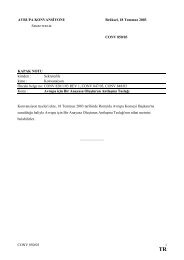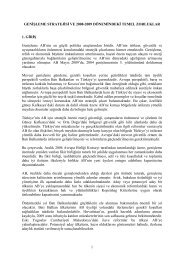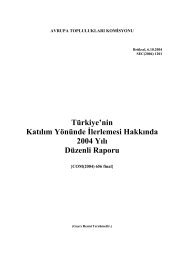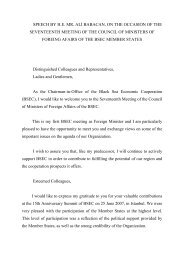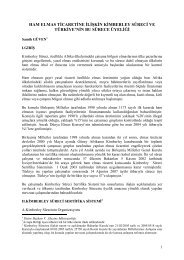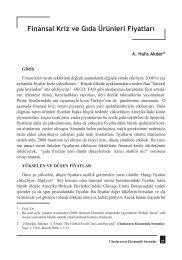Enlargement Strategy and Main Challenges 2006 - 2007
Enlargement Strategy and Main Challenges 2006 - 2007
Enlargement Strategy and Main Challenges 2006 - 2007
You also want an ePaper? Increase the reach of your titles
YUMPU automatically turns print PDFs into web optimized ePapers that Google loves.
government priority. The government established an agency for European integration <strong>and</strong><br />
adopted an action plan to address European Partnership priorities.<br />
As regards public administration, the provisional institutions have set up an independent<br />
oversight board <strong>and</strong> a senior public appointments committee. They have established new<br />
ministries of justice <strong>and</strong> of the interior. The government has made some progress in<br />
improving its coordination <strong>and</strong> policy-making capacities. The authorities exercise limited<br />
control over certain Kosovo Serb areas, particularly in the northern municipalities. However,<br />
Kosovo’s administrative capacity remains weak <strong>and</strong> the civil service overstaffed. A<br />
comprehensive reform of the civil service is needed. Appointments in the administration<br />
continue to be politically influenced.<br />
As regards the judicial system, the Kosovo Judicial Council <strong>and</strong> the Kosovo Judicial Institute<br />
were set up. Substantial responsibilities were transferred to the provisional institutions in<br />
order to increase local ownership <strong>and</strong> accountability. The current role of the Assembly in the<br />
appointment of judges <strong>and</strong> prosecutors undermines the independence of the judiciary <strong>and</strong><br />
allows political <strong>and</strong> ethnical considerations to interfere in what should be an objective <strong>and</strong><br />
technical recruitment process. Kosovo’s judicial institutions have made little progress in civil<br />
<strong>and</strong> criminal justice. The backlog of cases has increased <strong>and</strong> judgements are not always<br />
enforced. Rendering judgements in the high profile cases in relation to the March 2004 riots<br />
remains problematic due to a lack of diligence in case investigations by the police, lenient<br />
sentencing <strong>and</strong> a lack of cooperation from witnesses.<br />
In response to a key European Partnership priority, the government approved an anticorruption<br />
action plan, an anti-corruption council was established <strong>and</strong> the Assembly<br />
appointed the director of the anti-corruption agency. Nevertheless, corruption in Kosovo is<br />
still widespread <strong>and</strong> little progress has been made in effectively tackling corruption.<br />
In the area of human rights <strong>and</strong> the protection of minorities an advisory panel has been<br />
established to deal with complaints from persons claiming to be the victims of human rights<br />
violations by UNMIK. The m<strong>and</strong>ate of the international ombudsperson expired at the end of<br />
2005 <strong>and</strong> the assembly nominated a Kosovan acting ombudsperson.<br />
In spring <strong>2006</strong>, the President <strong>and</strong> the Prime Minister started a highly visible outreach<br />
campaign towards minorities. Both called on minority communities to consider Kosovo their<br />
home <strong>and</strong> to work together with Kosovo’s provisional institutions of self government.<br />
However, minorities continue to be in a disadvantaged position <strong>and</strong> further efforts are needed<br />
to combat intolerance. There have been a number of violent attacks against Kosovo Serbs<br />
particularly during the summer of <strong>2006</strong>. The conditions remain difficult for a sustainable<br />
return of refugees <strong>and</strong> displaced persons.<br />
Relations between Kosovo Serbs <strong>and</strong> Kosovo Albanians have remained strained. Belgrade has<br />
discouraged the Kosovo Serbs' participation in the provisional institutions <strong>and</strong> Kosovo Serbs<br />
have continued to boycott them.<br />
Concerning regional issues <strong>and</strong> international obligations, Kosovo has enhanced its<br />
participation in regional fora <strong>and</strong> cooperation initiatives, a key European Partnership priority,<br />
particularly in the areas of transport <strong>and</strong> energy. A free trade agreement with the former<br />
Yugoslav Republic of Macedonia entered into force <strong>and</strong> free trade agreements were signed<br />
with Croatia <strong>and</strong> Bosnia <strong>and</strong> Herzegovina.<br />
EN 47 EN


